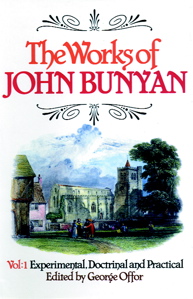 John Bunyan. “A Book for Boys and Girls: or, Temporal Things Spiritualized.” Pages 746–62 in vol. 3 of The Works of John Bunyan. Edited by George Offor. 3 vols. London: Blackie and Son, 1853.
John Bunyan. “A Book for Boys and Girls: or, Temporal Things Spiritualized.” Pages 746–62 in vol. 3 of The Works of John Bunyan. Edited by George Offor. 3 vols. London: Blackie and Son, 1853. ![]()

![]()
Upon the Disobedient Child [pp. 761–62]
Children become, while little, our delights!
When they grow bigger, they begin to fright’s.
Their sinful nature prompts them to rebel,
And to delight in paths that lead to hell.
Their parents’ love and care they overlook,
As if relation had them quite forsook.
They take the counsels of the wanton’s, rather
Than the most grave instructions of a father.
They reckon parents ought to do for them,
Though they the fifth commandment do contemn;
They snap and snarl if parents them control,
Though but in things most hurtful to the soul.
They reckon they are masters, and that we
Who parents are, should to them subject be!
If parents fain would have a hand in choosing,
The children have a heart will in refusing.
They’ll by wrong doings, under parents gather,
And say it is no sin to rob a father.
They’ll jostle parents out of place and power,
They’ll make themselves the head, and them devour.
How many children, by becoming head,
Have brought their parents to a piece of bread!
Thus they who, at the first, were parents joy,
Turn that to bitterness, themselves destroy.
But, wretched child, how canst thou thus requite
Thy aged parents, for that great delight
They took in thee, when thou, as helpless, lay
In their indulgent bosoms day by day?
Thy mother, long before she brought thee forth,
Took care thou shouldst want neither food nor cloth.
Thy father glad was at his very heart,
Had he to thee a portion to impart.
Comfort they promised themselves in thee,
But thou, it seems, to them a grief wilt be.
How oft, how willingly brake they their sleep,
If thou, their bantling, didst but winch or weep.
Their love to thee was such they could have giv’n,
That thou mightst live, almost their part of heav’n.
But now, behold how they rewarded are!
For their indulgent love and tender care;
All is forgot, this love he doth despise.
They brought this bird up to pick out their eyes.
